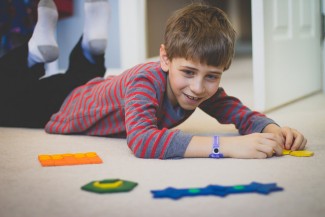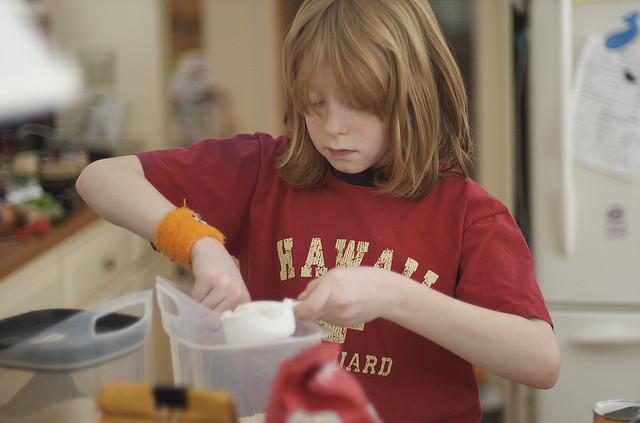Some kids just don’t “get” math. These children frequently seem to lack an intuitive sense of numbers, magnitudes, and patterns. They may struggle with estimating how long it might take them to do their homework, how much money it might cost to buy a toy, or even have difficulty in knowing how much they might want to eat or drink. In all likelihood, these children will find simple calculations to be problematic and may particularly struggle when doing mathematical word problems. In this edition of the LearningWorks for Kids Beyond Games series, we suggest a number of strategies for kids who need help making sense of math.
Engage your child with what interests him. Your child is more likely to put in effort and have a meaningful learning experience with math when he is interested in the work. Make estimating and predicting fun and engaging by basing these activities on things in which he is interested. Practice predicting which sports team will win a game based on simple statistics, estimating how long it will take to mix and bake a batch of cookies, or predicting how many blue cars he will see on the way to school. These exercises could even help him to apply these skills in the school setting.
Teach him to prioritize. Your child’s success in math depends almost entirely on his ability to identifying the question that needs to be answered. When approaching complicated math problems, teach him to ask, “What is the problem I am trying to solve?” Instruct him to look at the steps he will take to answer it before doing any of the work. It could be useful for him to identify the concepts involved in the math problem in order to avoid any unnecessary computations. Being armed with a plan of attack will help him to keep track of what he is doing when working on a complicated problem, and could empower him to try similar and more difficult problems.
Demonstrate mathematical reasoning. Many individuals struggle with making estimations and predictions because they are afraid they will be wrong. Make educated guesses, estimations and predictions based on known facts, out loud for him and explain the reasoning behind your computation. Detail the steps you used to arrive at your estimate or prediction. Once your child hears your thought process he is likely to become more comfortable making his own estimates and predictions. It might also be helpful to talk about a mistake you made in the past when estimating or predicting something to show him that it is okay to be wrong sometimes and that estimations and predictions are not usually perfectly accurate.
Tap into your child’s multiple intelligences. The teaching of math is often reliant on memorization or the repetitive practice of paper-and-pencil problem solving. However, opportunities for discussions of math abound in daily life outside the classroom. Children are more open to situations that engage their individual learning styles and strengths, and their math awareness can be greatly increased by incorporating art, music, or movement into math practice. Children who are musically talented could benefit from helping create or identify songs as mnemonic devices to remember multiplication facts. Use his interests to find opportunities to apply math facts. Manipulatives could also be used in hands-on activities to reinforce math concepts, such as practicing division by separating 20 toys into groups of 5 and finding how many toys are in each group.
Build “number sense” through practice. Practice does make perfect, or, at least, better. The more children practice at home the more likely they are to be comfortable with math in a school setting. Some teachers have “estimation stations” or “estimation jars” in their classrooms to encourage students to estimate the number of items, like jelly beans, erasers, or small toys, in a container. Do this at home with Mason jars of candy or coins to encourage practice estimating. Start with a series of containers of the same shaped but different sizes and provide the actual total of objects in one of the medium-sized containers in order to give him a basis from which to estimate.
There are a variety of apps and video games to help your child build math skills, but here are some entertaining non-digital ways to boost his confidence and ability in math:

Image: Flickr user Anthony J
Work on puzzles. Common jigsaw puzzles are great for building math spatial awareness. Encourage your child to identify the most likely pieces to fit a certain space based on color, shape, and size. Consider purchasing tangrams, geometric puzzle sets that fit together in endless ways and can result in multiple designs. You can get tangrams in wood, like those your child’s teacher most likely uses in the classroom, or buy a magnetic set so he can play with geometry on the fridge while you prepare dinner.
Estimate the area of common spaces. How big do you think your playroom is? Is it bigger or smaller than mom’s home office? Than your bedroom? How big is the garden? The back porch? Picking familiar areas that are easily measurable present interesting and accessible opportunities to build your child’s everyday math awareness. Get the tape measure out after the estimates are made to check how accurate they are. Further challenge your child by comparing spaces at home to spaces away from home. What’s the estimated area of grandma’s living room? Is it bigger or smaller than our living room?
Prepare recipes together. Equip your child with math skills as well as real world skills by enlisting him to help you cook or bake. Make breakfast muffins together. Including the baking time, how much time do you think it will take to complete the recipe? Have your child help you measure ingredients. Does the flour look like less or more when it is in the measuring cup as opposed to the mixing bowl? Where do you think the milk level will be after you take a cup out of the jug? These estimation exercises take on another dimension if you use a scale for baking. What does 120 grams of flour look like? How much do you think one of the muffins weighs?
For other Beyond Games posts about math practice outside the video game world, see The Child Without Number Sense and Make Real World Math More Interesting.
Featured image: Flickr user Tim Pierce




